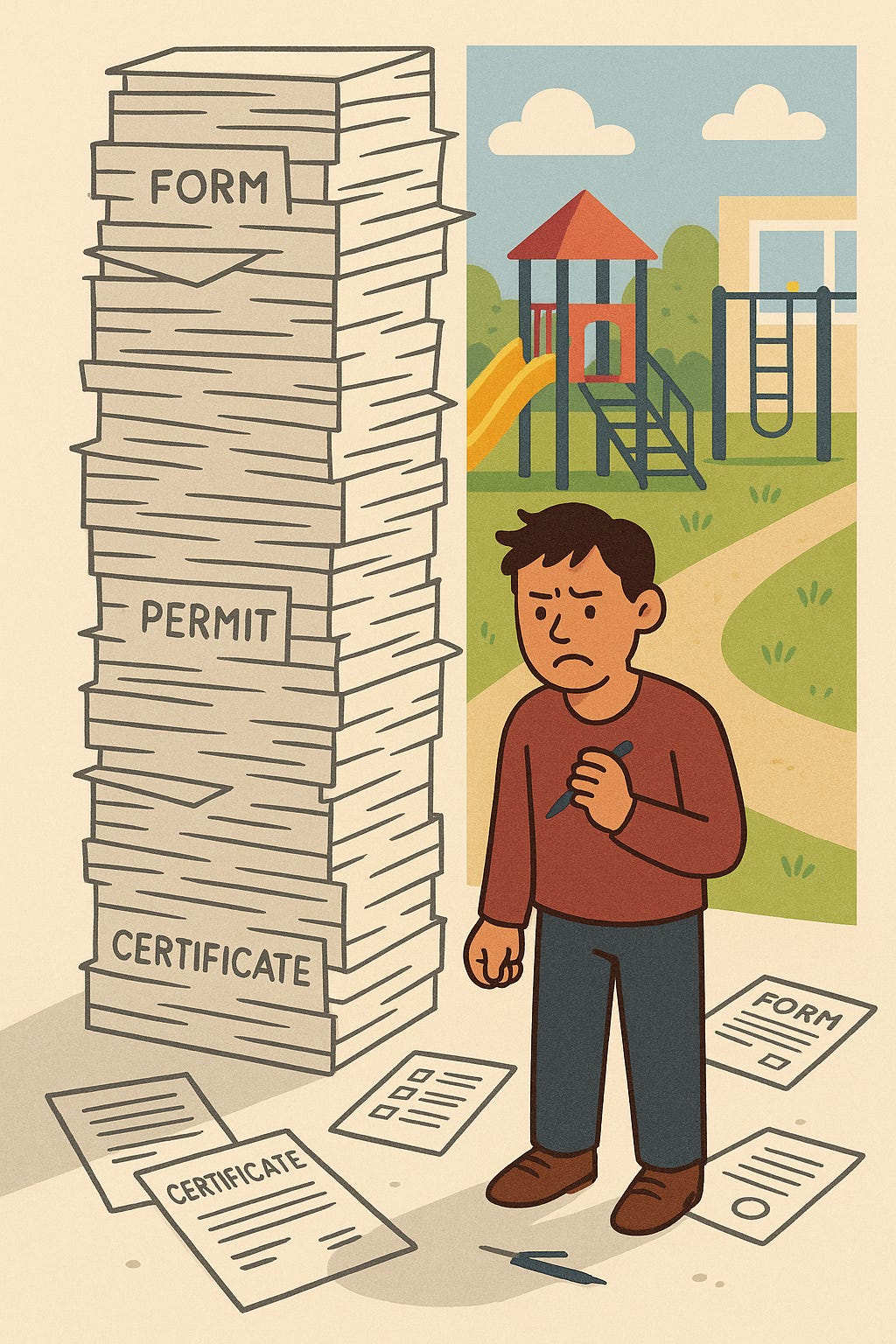The Costs of Permission
By Richard Y Chappell🔸 @ 2025-07-07T16:49 (+11)
This is a linkpost to https://www.goodthoughts.blog/p/the-costs-of-permission
Against barriers to good behavior
Apparently, Italy requires residents to secure a medical certificate before joining a gym, sports club, or other source of regular physical exercise. This is (very loosely) estimated to prevent a few deaths per year from sudden cardiac events but at a net cost of thousands of QALYs lost due to exercise deterrence. Pretty wild—and a sobering reminder of how extraordinarily bad it can be to make it more costly or inconvenient for individuals to do good things. I’d say that one of the top priorities of public policy should be to shape our choice environment so that it’s easier to do good and worthwhile things (balanced appropriately against deterring bad things).
Of course, to put this principle into practice, you need to have some sense of what’s good and worthwhile. I think this is too often missing: many people neurotically prioritize badness-avoidance above all else, especially when in a moralistic frame of mind. Exercise licenses are a sufficiently egregious example that I expect most Americans, at least, to immediately grasp the problem with them. But for a more subtle example, consider philosophical arguments about parenting licenses.

‘Licensing Parents’, a famous paper by Hugh LaFollette in 1980, argues that “the state should require all parents to be licensed,” just as it requires of car drivers. His central principle:
Any activity that is potentially harmful to others and requires certain demonstrated competence for its safe performance, is subject to regulation—that is, it is theoretically desirable that we regulate it. If we also have a reliable procedure for determining whether someone has the requisite competence, then the action is not only subject to regulation but ought, all things considered, to be regulated.
This is a clear example of what I call “void-embracing” philosophy: implicitly giving lexical priority to harm-aversion, while forgetting that upsides matter too. Besides their potential for harm, things can also be good, or such that we might want to increase rather than decrease their propensity.
If actions can be good, and regulating them imposes costs that make individuals less likely to choose to pursue the option, then the quoted conditions are insufficient to establish that the actions “all things considered” ought to be regulated. Instead, you have to do a cost-benefit analysis, and compare how much harm the regulations would avert versus how much good they risk averting (due to deterring competent agents who would have done the valuable thing without the added cost, but aren’t willing to jump through the new hurdles in order to do it). Only if the regulation does more good than harm (by averting more harm than good) is it all-things-considered worth it. Merely knowing that it reliably averts harms is not enough.
Parenting is good, actually
LaFollette describes parenting as a “hazardous activity”, which is true enough in the sense that bad parents can do a lot of harm. But it’s important to keep risks and downsides in perspective. LaFollette writes that “My principal concern is to protect children from maltreatment by parents.” While he would be open to considering less invasive methods like tax incentives for parenting classes, “I begin by advocating the more strict form of licensing since that is the standard method of regulating hazardous activities.”
But something has gone very wrong if “HAZARD!” (in flashing red lights) is your primary association with parenthood. I guess LaFollette was writing at a time when it was generally assumed that more than enough people were strongly motivated to become parents, so a slight reduction in supply may not have registered as a significant cost, compared to the potential upside of higher average quality. But those background assumptions no longer apply.
We now find not enough people have enough motivation to do enough parenting. While it’s tragic that some kids are mistreated, and we should certainly try to reduce this (via methods that do more good than harm), I think it’s even more tragic that many kids who could have had happy lives that contributed positively overall to society will never get to exist at all.[1] That’s a massive amount of good that’s on the line (both for the individuals in question, if they got to exist, and for society in any case), and it accordingly ought to play a much larger role in how we think about this topic.
Concluding with a better analogy: Licensing Donors
Rather than driving, consider philanthropy. Some philanthropy is outright harmful. (“Hazardous!”) And as effective altruists emphasize, an awful lot is vastly less well-targeted than it could be. Still, I’ve never heard anyone suggest that the state should require that people get a license before they’re allowed to donate to charity. And I think there’s a good reason for that: we all recognize that charity is, by and large, a good thing, and it would be a bad idea to put up barriers that made it a less appealing choice.
The same is true, I think, of parenting. It’s something society should be trying to encourage, not discourage.
- ^
For those who don’t share this judgment: would you endorse voluntary human extinction in order to ensure that no future child ever suffers again? If you’re broadly pro-human—glad that humanity exists at all—then you’re already committed to the view that the positive things in life are more important than the occasional sob story. People don’t like to openly admit this sort of thing because it sounds callous to low-decouplers. But you can care deeply about reducing suffering while simultaneously acknowledging that positive flourishing, globally speaking, is even more important. Don’t Void Your
PetsBabies!